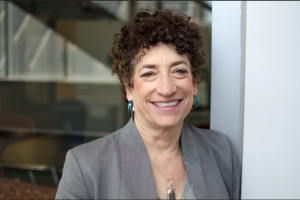Perspectives of Scientists Who Become Targets: Naomi Oreskes
This series profiles scientists who have been threatened with legal attacks or harassed by politically and ideologically motivated groups. What these researchers experienced, how they responded, and the lessons they learned provide valuable guidance for other scientists, and will help all readers understand the issues climate scientists may encounter because of their work.
###

Naomi Oreskes, a science historian, earth scientist, and author, first became a target of the anti-climate science movement in 2004 when she published documentation of the scientific consensus on climate change.
A professor of the history of science and affiliated professor of Earth and planetary sciences at Harvard University, Oreskes originally trained as a geologist. In her many books and peer-reviewed papers, Oreskes examines the history of scientific knowledge in the Earth and environmental sciences, and on scientific consensus and dissent. She is a founding member and current board member of the Climate Science Legal Defense Fund.
In 2004, Science magazine published a peer-reviewed article by Oreskes on the state of scientific knowledge about anthropogenic climate change. After analyzing 928 scientific abstracts with the keywords “global climate change,” she found no disagreement in the scientific community that human activities were resulting in global warming. All of the papers reviewed agreed with the judgment of the Intergovernmental Panel on Climate Change, the National Academy of Sciences, and other leading professional scientific societies and organizations on this point.
Oreskes began receiving hate mail just days after her Science essay came out. Soon after that, James Inhofe (R-Oklahoma), who has called global warming a “hoax,” attacked her on the floor of the U.S. Senate. Extremely hostile letters were sent to Science in response to the study. But not a single climate scientist disputed her finding; economists and others affiliated with libertarian, pro-free market think tanks, such as the Competitive Enterprise Institute, wrote most of the critical letters.
At first Oreskes didn’t understand why she was being attacked by economists — she hadn’t expressed policy preferences or suggested solutions; in fact, she had stated in the article that even when there is a scientific consensus, it does not necessarily mean it’s true, nor does it tell us what to do. She came to realize that the harassment had absolutely nothing to do with the science.
Oreskes reached out to climate scientist Ben Santer, who connected her with a network of scientists who had also been attacked. The network helped Oreskes understand that the harassment wasn’t personal; it was about the role she plays in the conversation on climate science.
“We weren’t being attacked because we’d done something wrong,” said Oreskes. “We were being attacked because we’d done something right. Because we’d explained something significant, we’d laid facts on the table, those facts had implications, and some people were threatened by those implications.”
Subsequently, Oreskes began working with Erik Conway, a science and technology historian at NASA’s Jet Propulsion Lab; their collaboration evolved into the 2010 book Merchants of Doubt (which was the basis for the 2014 documentary film directed by Robert Kenner). Oreskes and Conway exposed a network of ideologues that attacked scientific data on several issues: the ozone hole, acid rain, tobacco use, and climate change.
The common thread among these issues is that the scientific implications of each imply the need for some kind of government regulation as a solution, challenging the ideology of laissez-faire capitalism. A common tactic used by those resisting policy solutions and attacking the scientific data is to sow doubt and confusion about the science among the general public — a strategy still being used today with climate change.
When the book was published, climate contrarian and atmospheric physicist S. Fred Singer, identified as one of the merchants of doubt, critiqued Oreskes’ and Conway’s research and professionalism, but he failed to discredit them. He later wrote to other climate contrarians for advice on blocking the release of the film and considered suing Oreskes but ultimately decided not to.
Today, Oreskes does not experience as much harassment, but if she does something very public, she will receive hostile emails. She doesn’t read them.
Oreskes says she jumped at the chance to become involved with the Climate Science Legal Defense Fund when co-founder Scott Mandia asked her to be a founding member of the board in 2012. She is pleased that the organization doesn’t just defend scientists who have been attacked; it also helps scientists understand their rights and responsibilities so that they can be clear and open about their work, and protect themselves from harassment.
Oreskes advises scientists who have been attacked or received a FOIA request to pick up the phone and call CSLDF. “We will connect you with a good pro bono lawyer. Don’t try to do this on your own.”
And for scientists who are concerned that they might be harassed, Oreskes has the following advice: “Do your science the way you would do it no matter what. Don’t let these people intimidate you because they want you to be intimidated. You should be honest about what you think your scientific findings tell you and not let yourself be pushed one way or the other by the external political pressure. And if you do get harassed, know that the Climate Science Legal Defense Fund has your back.”
— Renee Cho is a blogger for Columbia University’s Earth Institute